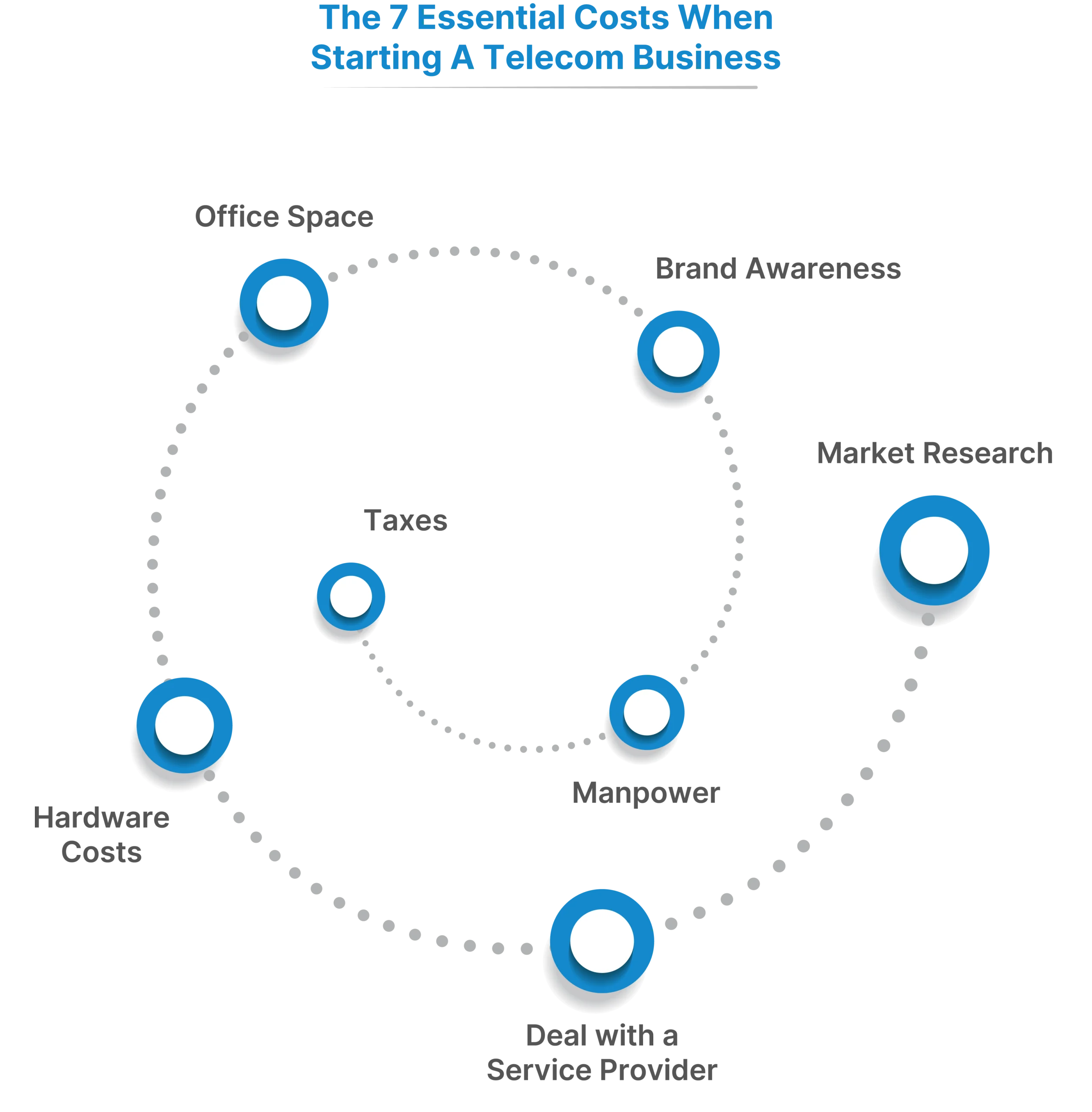While the field of communications can be both an interesting and lucrative business endeavor, it is also an oversaturated market.
This severely minimizes the chance of breaking through the vast sea of competitors, at least without significant investment, even for those with existing clients who are looking to expand their comms service offering.
But, not everyone has the capital handy to do so, which is why they turn to partnering with existing service providers in order to establish a safe footing in the industry, a foundation for the future.
Even with that in mind, the level of service differs from one SP to the next, and it is important that you know what to look for in order to get the most cost-efficient options for your business.
So, let us navigate through all the comms necessities and their costs as well as how you can work around them to maximize ROI to allow for healthy growth.

Before You Begin: Market Research
Considering the saturation of the telecommunications market, you can not go blindly into it and launch a product that may look good on the surface, but fail because it does not satisfy the niche that your audience is looking for.
Do some market research on them or your general target area of operation and find out what it is that existing services lack in the sector that you can offer to the public.
Once you discover this particular niche, focus on it and ensure that your product can cover it. You do not have to make it the main feature of your product, but incorporating it into your marketing campaign should give you the edge over your competitors and help you push through into the market a little easier.
This is the initial, mandatory step whose cost depends on scale, length of research and several other factors.
Moreover, if you have an existing customer base and are looking to expand, capitalize on them by including them in your market research to explore whether they would be interested in your new offerings or not.
The best advice on minimizing costs during the research phase is to keep questions down to the most important ones and to not go too wide and to find a reputable marketing agency to help out in this regard.
Finding The Right Platform
After finishing up with market research, the next step will involve finding the ideal platform to start with.
Arguably the most varied stage when it comes to start-up as there are so many options to choose from, each with a different offer and differing costs for their services.
The Initial Buy-in
There is always an initial buy-in to cover the costs of the software licenses, the hardware itself as well as the included training for your employees to learn how to operate all of it.
The Hidden Costs
However, some SPs will also involve subscriptions and other hidden costs, expenses that escape your initial cost assessment that will only begin piling up over time and start constraining your growth options.
There is also the SPs offer to consider as you will rarely find one that offers you exactly everything that you need from the start, but there are those that are flexible and easier to work with.
Look for service providers that can offer you a lot initially with little to no recurring costs, ones that are communicative and listen to feedback, SPs that could help you shore the rest of your necessities up over time.
This might feel like searching for a needle in a haystack, but Bicom Systems has you covered with our partner-centric policy which does not involve any initial buy-in or any hidden costs afterwards, allowing you to free up a good chunk of your capital and redistribute it toward growing your business.
We keep everything transparent as your growth eventually equates to our own growth down the line which is something we do not hinder in any way.
Equipment Costs
The next cost to consider revolves around the equipment needed to run your comms business.
Thankfully, with VoIP, the usual astronomical costs of establishing your own infrastructure have been slashed tremendously, only requiring servers and phones on your end in terms of hardware instead of having to set up a whole cell tower network like before.
Even still, the costs can be deceptive as the amount spent can depend on your service provider’s compatibility with hardware options as well as the payment plan for the hardware itself.
Software Compatibility
For instance, most SPs design their software to be compatible with most hardware to make integration with partners easier and is your most ideal option, but do be wary that some SPs will also intentionally design their products to only work with very limited hardware options that either they alone produce or they are in contract with the manufacturer for, severely limiting your options with acquisition and support in case of emerging issues.
Buying Or Renting Hardware
Additionally, hardware is often either bought outright or rented with the former being the more favorable option in the long-term despite being a bigger upfront cost.
However, some service providers, particularly those who limit their product’s hardware compatibility, will opt for the subscription option, only letting you rent the hardware out, leading to continuing monthly fees which only create an extra burden on your finances.
Be careful when choosing and find the option that is right for you.
Ideally, that should be a product that is compatible with most devices so you can use any leftover hardware that you may have, or so you can have more freedom with your hardware options.
Alternatively, you would also be able to explore a fully hosted option through your VoIP platform provider to cut down on overhead costs even more.
Office Space
Depending on how you set your business up, office space may be a big or negligible cost. With the popularization of Work from Home and Hybrid work strategies, your employees can turn their homes into their offices with only minimal staff required to be on-premise if your setup even requires any to begin with.
Regardless, an office space is still an expected expense as you will need a space to greet clients in at the very least and anything from the space itself to the furniture and utilities has to be paid.
Brand Marketing
If you are looking to be a name for yourself rather than just be a reseller for a bigger brand, then you will also need to invest in marketing your own brand. If people are not aware of you, you will not get nearly as many leads as you expect to.
This also means getting a white label or private label product from a service provider that you can sell as your own.
Unfortunately, not every SP has this option as they have their own brand to think about too, so your pickings may grow slimmer if this is a requirement.
But, do not worry, Bicom Systems has you covered with robust options for both white and private labels for our products at competitive prices, letting you sell the product completely separate from our own name.
Employees
Rarely any business functions with a single person at the helm, especially in the field of telecommunications, thus you will need to secure both employees and employee benefits. Paychecks, PTOs, insurance, etc. All of these have to be considered and will likely make up most of your costs going forward, so cementing this step is arguably the most crucial for the long term.
Taxation
While not calculated into the initial startup costs, tax is something that you will have to concern yourself with annually and it is best if you keep it in mind from the get go so you do not miscalculate when it is time to pay up.
Managing The Risks
When starting any business, risks are ever present. The key is to learn how to manage them and turn them into opportunities.
Seeking Investors
If you are unable to finance everything that you need to get your business started, it may be wise to seek investors for your project, securing extra funding that way that will still leave you with capital that can be funneled toward growth and future independence if need be.
Utilizing What You Have
Do not fall into the trap of a service provider that requires you to use their specific hardware or one that only offers renting hardware out.
As mentioned earlier, that will only lead to higher costs down the line which could hurt you in the long run.
Instead opt for solutions that are hardware agnostic, allowing you to grab a more cost-efficient hardware option and save up on overall costs by a significant margin or to simply use hardware that you may have lying around.
Double-check Everything
When you develop your business strategy, make sure to look everything over. You do not want to overlook anything that may cause a problem. Take everything noted here into account and, if need be, hire a financial advisor to see if your plan is sound. It may be an extra expense, but it will ensure that everything is in order going forward.
A Sound Foundation (With Some Help)
While you can only do so much to prepare your business, keep in mind that hurdles are inevitable.
Just make sure that you are well prepared for them with a solid foundation on which your business can stand on.
In the telecom business, this consists of a quality business strategy, starting capital either from your own pocket or funded by investors, and a good partnership with a service provider that you can trust.
All of these will help mitigate the costs of starting a business tremendously, cutting out the unnecessary parts and focusing on the core aspects of a telecom business.
While we cannot help with every aspect of your business, Bicom Systems is welcome to cover the service provider aspects with a partner-centric mindset and a flexible offer that caters to your needs among other benefits that will not hinder you in any way.
If you want to find out more, be sure to contact us, or request a demo of our products to see whether we have what you need.

